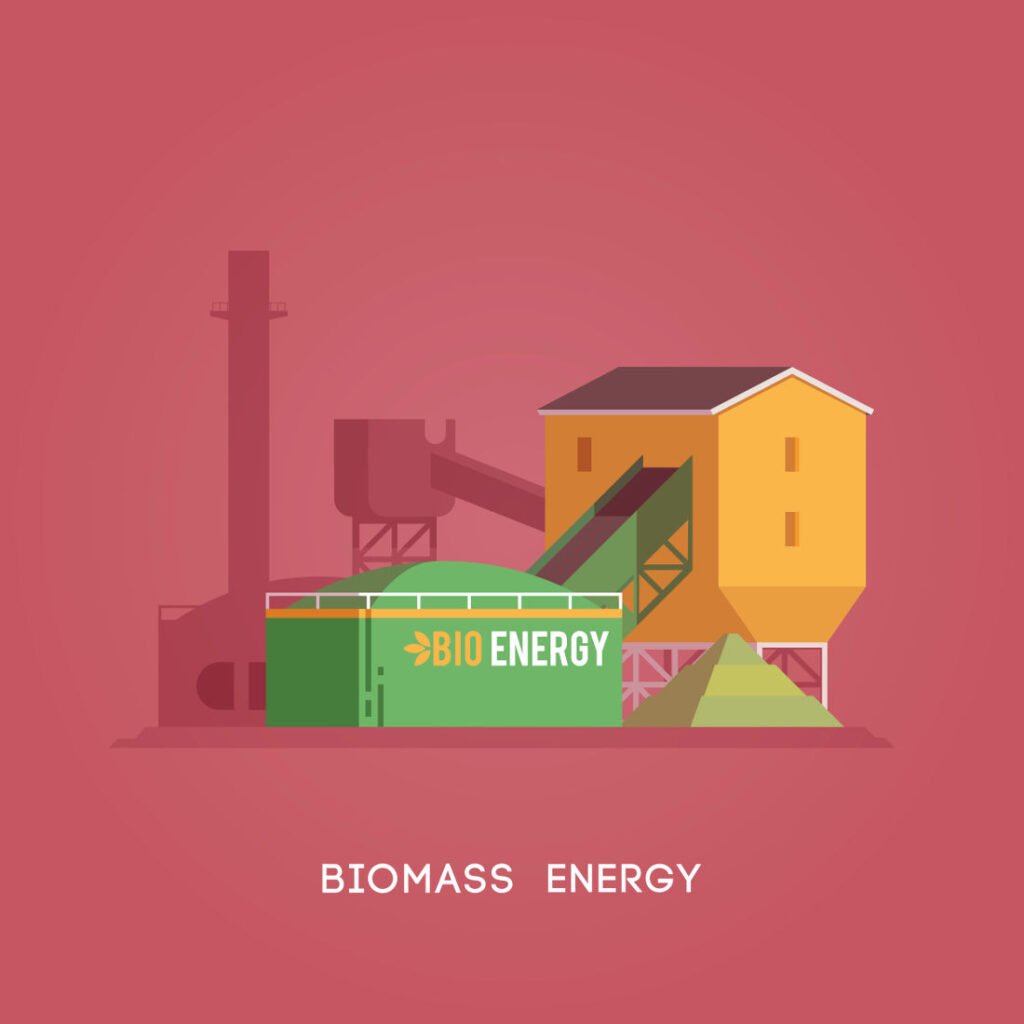Introduction to Biomass Energy
Biomass energy is a renewable energy source that harnesses the power of organic matter to generate heat and electricity. It is derived from a variety of sources, including wood chips, agricultural waste, and dedicated energy crops. Unlike fossil fuels, biomass energy is carbon-neutral, as the carbon dioxide released during combustion is offset by the carbon dioxide absorbed by the plants during their growth. This article aims to provide a comprehensive guide to understanding what biomass energy is and how it can be harnessed through biomass boilers.
How Does Biomass Energy Work?
Biomass energy is created by converting organic materials into fuel that can be burned to produce heat or electricity. The process begins with the collection of biomass feedstock, which can include wood chips, straw, or even energy crops like switchgrass. The feedstock is then processed to remove impurities and moisture, resulting in a clean and dry fuel source. This fuel is then fed into a biomass boiler, where it is ignited and burned. The heat generated from the combustion process is used to produce steam, which can be used to power a turbine and generate electricity, or it can be used directly for heating purposes.
Types of Biomass Fuels
Biomass fuels can be categorized into two main types: woody biomass and non-woody biomass. Woody biomass includes materials like wood chips, sawdust, and wood pellets. Non-woody biomass, on the other hand, includes agricultural waste, such as straw and corn stover, as well as dedicated energy crops like miscanthus and switchgrass. Both types of biomass fuels have their advantages and disadvantages, depending on factors such as availability, cost, and energy density.
What is a Biomass Boiler?
A biomass boiler is a specially designed system that is used to burn biomass fuels and generate heat or electricity. It consists of a combustion chamber, where the biomass fuel is burned, and a heat exchanger, where the heat from the combustion process is transferred to a fluid or air. The heated fluid or air can then be used for various purposes, such as space heating, water heating, or electricity generation. Biomass boilers are available in a range of sizes and configurations, from small domestic systems to large industrial installations.
Benefits of Biomass Boilers
Biomass boilers offer numerous benefits over traditional fossil fuel boilers. Firstly, they are a renewable energy source, which means that the fuel used is constantly replenished. This makes biomass boilers a sustainable and environmentally friendly option. Secondly, biomass fuels are often cheaper than fossil fuels, providing cost savings for homeowners and businesses. Additionally, biomass boilers can help to reduce carbon emissions, as they produce less carbon dioxide compared to fossil fuel boilers. Lastly, biomass boilers can be used in combination with other renewable energy sources, such as solar panels or wind turbines, to create a more comprehensive and efficient energy system.
Different Types of Biomass Boilers
There are several types of biomass boilers available on the market, each with its own unique features and advantages. One common type is the wood chip boiler, which is designed to burn wood chips as fuel. Wood chip boilers are typically used in larger installations, such as commercial or industrial buildings. Another type is the pellet boiler, which uses compressed wood pellets as fuel. Pellet boilers are often used in residential settings, as they are compact and easy to install. Other types of biomass boilers include log boilers, which burn logs or wood waste, and straw-fired boilers, which are specifically designed for burning straw.
How to Choose the Right Biomass Boiler for Your Needs
Choosing the right biomass boiler for your needs can be a daunting task, as there are many factors to consider. Firstly, you need to determine the size and capacity of the boiler required to meet your heating or electricity needs. This will depend on factors such as the size of your property, the number of occupants, and the desired temperature. Secondly, you need to consider the type of biomass fuel that is readily available in your area. Availability and cost will play a significant role in the decision-making process. Finally, it is essential to choose a reputable and experienced supplier or installer who can provide guidance and support throughout the installation and maintenance process.
Biomass Boiler Installation Process
The installation process of a biomass boiler typically involves several steps. Firstly, a site survey is conducted to assess the suitability of the property and determine the best location for the boiler. Next, the necessary permits and approvals are obtained from the relevant authorities. Once the paperwork is in order, the boiler is delivered to the site and installed by qualified professionals. This includes connecting the boiler to the heating or electricity system, as well as installing any necessary storage tanks or fuel delivery systems. Finally, the boiler is tested and commissioned to ensure it is functioning correctly and efficiently.
Maintenance and Troubleshooting of Biomass Boilers
Proper maintenance and regular troubleshooting are essential for the efficient and reliable operation of biomass boilers. Regular maintenance tasks include cleaning the combustion chamber and heat exchanger, inspecting and replacing any worn-out parts, and ensuring proper fuel storage and delivery. Troubleshooting involves identifying and resolving any issues that may arise, such as fuel blockages, ignition problems, or system malfunctions. It is recommended to have a maintenance schedule in place and to work with a qualified technician or service provider to ensure the longevity and performance of your biomass boiler.
Cost of Biomass Boilers and Potential Savings
The cost of biomass boilers can vary depending on factors such as size, capacity, and fuel type. Generally, biomass boilers are more expensive than traditional fossil fuel boilers. However, the higher upfront cost can be offset by long-term savings on fuel and energy bills. Biomass fuels are often cheaper than fossil fuels, and the use of biomass boilers can result in significant cost savings over time. Additionally, biomass boilers may be eligible for government incentives, grants, or financing options, further reducing the overall cost of installation and operation.
Biomass Heating Systems for Residential and Commercial Use
Biomass heating systems can be used in both residential and commercial settings. In residential applications, biomass boilers can provide space heating, water heating, and even electricity generation for single-family homes or multi-unit buildings. In commercial settings, biomass heating systems can be used to heat offices, schools, hospitals, or industrial facilities. They can also be integrated into district heating networks, where multiple buildings are supplied with heat from a central biomass boiler. Biomass heating systems offer a reliable and sustainable alternative to traditional heating systems, providing comfort and cost savings for homeowners and businesses alike.
Case Studies of Successful Biomass Boiler Installations
To further illustrate the benefits and potential of biomass boilers, let’s take a look at some real-life case studies. In a residential setting, a family in the countryside installed a wood chip boiler in their farmhouse. The boiler not only provided heating and hot water for the entire house but also powered a small generator to supplement their electricity needs. The family saw a significant reduction in their energy bills and enjoyed the cozy warmth provided by the biomass boiler. In a commercial setting, a school in a rural area installed a biomass heating system to replace their outdated oil-fired boilers. The school not only saved money on fuel costs but also reduced their carbon footprint and provided a valuable educational opportunity for the students to learn about renewable energy.
Environmental Impact of Biomass Energy
Biomass energy has a relatively low environmental impact compared to fossil fuels. When biomass fuels are burned, they release carbon dioxide into the atmosphere. However, this carbon dioxide is offset by the carbon dioxide absorbed by the plants during their growth, making biomass energy carbon-neutral. Additionally, the use of biomass energy helps to reduce reliance on fossil fuels, which contributes to air pollution and climate change. By utilizing biomass energy, we can reduce greenhouse gas emissions, improve air quality, and mitigate the environmental impact of energy production.
Government Incentives and Grants for Biomass Boilers
To encourage the adoption of biomass boilers and promote renewable energy, many governments offer incentives and grants to homeowners and businesses. These incentives can include financial support, tax credits, or subsidies for the installation and operation of biomass boilers. Additionally, some governments have introduced renewable energy targets or regulations that require a certain percentage of energy to come from renewable sources. By taking advantage of these incentives and grants, individuals and businesses can make the transition to biomass energy more affordable and accessible.
Conclusion
Biomass boilers offer a sustainable and environmentally friendly alternative to traditional heating and electricity systems. By harnessing the power of organic matter, we can reduce our reliance on fossil fuels and mitigate the environmental impact of energy production. Biomass boilers come in various types and sizes, making them suitable for both residential and commercial applications. By choosing the right biomass boiler and working with reputable suppliers and installers, individuals and businesses can enjoy the benefits of biomass energy, including cost savings, reduced carbon emissions, and a more sustainable future.
Are you interested in exploring the benefits of biomass boilers for your home or business? Contact Proadvance Ltd today for a consultation and find out how biomass energy can work for you.



